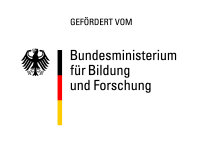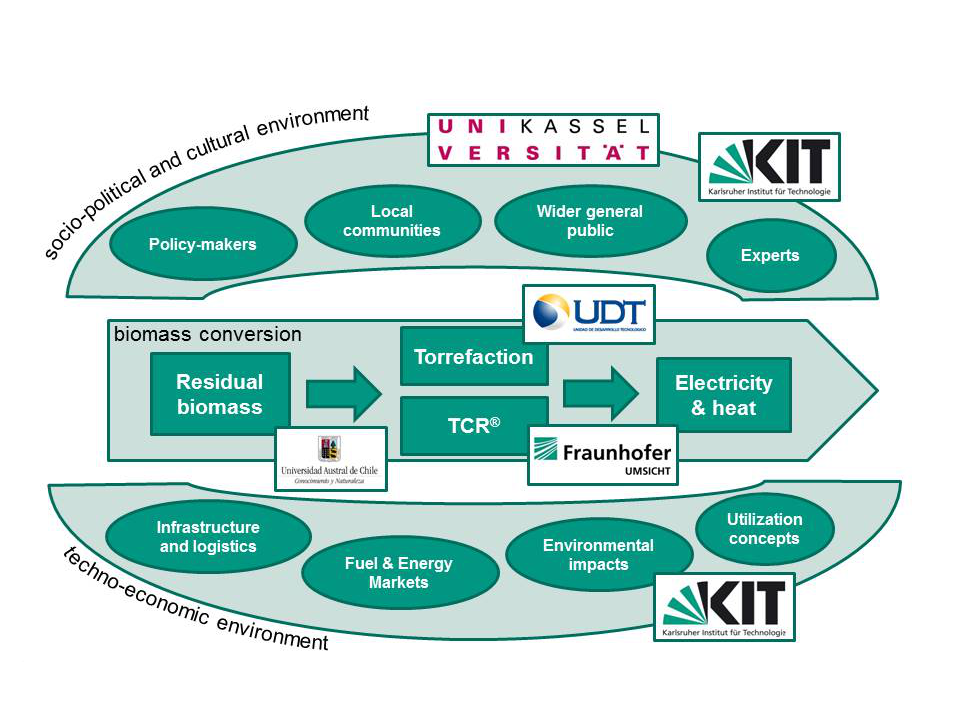Bioeconomy International: Semi-Mobile Bioenergy from Agricultural and Forest Residues in Chile and Beyond (SeMoBioEnergy)
- contact:
-
project group : - funding:
Federal Ministry of Education and Research (BMBF)
Grant number: 031B0056A - partner:
Institut für Industriebetriebslehre (IIP), Karlsruher Institut für Technologie (KIT)
Fraunhofer-Institut für Umwelt-, Sicherheits- und Energietechnik (UMSICHT)
Institut für Betriebswirtschaftslehre (IBWL), Universität Kassel
Unidad de Desarrollo Tecnológico (UDT), Universidad de Concepción (UdeC)
Instituto Bosque y Sociedad (IBOS), Universidad Austral de Chile (UACh) - start:
09/2015
- end:
08/2018

Chile’s energy demand has grown immensely over the past years and is expected to further increase. The forest and agricultural sector can contribute to the satisfaction of this demand as there are promising sources of residual biomass – e.g. forest residues or wheat straw - which could be utilized for the production of electricity or heat. For an efficient utilization of the named residues it is crucial to consider shifting harvesting sites. Thus, there is the necessity for flexible utilization concepts, which have not been explored so far. This aspect is not only relevant for Chile but also for all other countries and regions which use residues from forest plantations.
At the example of Chile, this project aims at contributing to develop such adaptable regional bioenergy concepts. Hereby, special emphasis will be placed on the development of sustainable utilization concepts, which are economically, ecologically and socially favorable.
The project will consider two promising and currently widely discussed energy densification technologies: a torrefaction/pelletizing and a small scale pyrolysis unit. For both technologies semi-mobile units, i.e. technologies which are with comparable small efforts transferable to other sites, will be developed and adapted to the envisaged usage in Chile. This will be accompanied by the development of utilization concepts covering the whole value chain from the production of residues in forest and agricultural lands, to possible pretreatments, conditioning, the densification and conversion technologies, the use of torrified biomass and pyrolysis and post-reforming products, e.g. in combined heat and power plants (CHPs), and energy provision to customers, including the involvement of relevant stakeholder groups.
As an outcome of this project, different efficient concepts for utilizing residues from forest plantations and agriculture for each technology will be proposed and assessed concerning their suitability for Chile. Especially the densification of the energy content per ton of transported biomass material increases the efficiency of the transport. Therefore, a special focus of the project is set on technologies for biomass processing with an integrated consideration of the logistics systems for supplying even larger areas with energy from forest residues and straw. The focus will be on southern Chile as the majority of forest plantations as well as agricultural areas are situated in this area. In particular the regions BioBio, Araucania, Los Rios, Los Lagos, and Aysen are considered. Even though the utilization concepts will be developed for this specific part of Chile, one important task of the project will be to address the transferability of those concepts and technologies to other countries and regions in the world.

Research focuses at IIP
- Elaboration and assessment of utilization concepts
- Techno-economic and environmental assessment of value chains
- Stakeholder management and social responsibility of value chains
